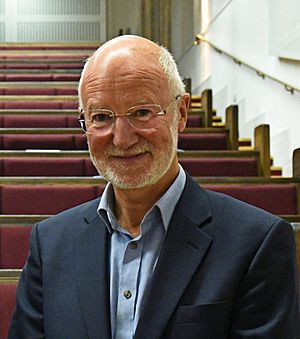Nicholas Barry Davies facts for kids
Quick facts for kids
Nicholas Barry Davies
|
|
|---|---|
 |
|
| Born | 1952 (age 73–74) |
| Citizenship | British |
| Alma mater | |
| Awards |
|
| Scientific career | |
| Fields | Zoology |
Nicholas Barry Davies (born in 1952) is a British expert who studies animals in their natural homes. He is a zoologist, which means he studies animals. He is also a professor at the University of Cambridge, where he teaches about how animals behave in their environment.
Contents
Understanding Animal Behavior
Professor Davies is famous for his work in a field called behavioural ecology. This is the study of why animals act the way they do. It looks at how their actions help them survive and have babies in their natural surroundings. He wrote books with another scientist, John Krebs, that helped explain this exciting area of science.
The Secret Lives of Dunnocks
One of Professor Davies's most interesting studies was about a small brown bird called the dunnock. He watched these birds very closely to see how they lived and raised their young. He used DNA tests, like those used to find out who someone's parents are, to learn which dunnock parents had which chicks.
This research showed that dunnocks have many different ways of forming families. Sometimes, one male and one female stay together (this is called monogamy). Other times, one male might mate with several females (polygyny). Or, one female might mate with several males (polyandry). Sometimes, both males and females have multiple partners (polygynandry). His work helped us understand how these different family setups happen in nature.
The Cuckoo's Clever Tricks
Professor Davies also spent a lot of time studying cuckoos. Cuckoos are known for being "brood parasites." This means they lay their eggs in the nests of other birds, called "host" birds. The host birds then raise the cuckoo chicks, thinking they are their own!
His studies showed that cuckoos and their host birds are in a constant "arms race." Cuckoos develop new ways to trick the host birds, like making their eggs look similar to the host's eggs. In return, the host birds try to get better at spotting the cuckoo eggs. It's like a never-ending game of hide-and-seek!
Other Animal Adventures
Professor Davies also studied other animals. He looked at how pied wagtails protect their feeding areas. He also researched how butterflies and toads behave when they are looking for a mate. Another area of his work explored how young birds become independent from their parents.
Recognized for His Work
Professor Davies has received many important awards for his amazing research.
- In 1994, he became a Fellow of the Royal Society, which is a very high honor for scientists in the UK.
- He won the Medal of the Association for the Study of Animal Behaviour in 1996.
- He was the president of the International Society for Behavioural Ecology from 2000 to 2002.
- His books about cuckoos, Cuckoos, Cowbirds and Other Cheats (2000) and Cuckoo - Cheating by Nature (2015), both won the "Best Book of the Year Award" from the British Trust for Ornithology and British Birds.
- In 2015, he received the Croonian Medal and Lecture from the Royal Society, which is one of their most important awards.
Media Appearances
Professor Davies's research has been featured in several media programs, helping more people learn about animal behavior.
- In 2009, his work was shown in a BBC Natural World program called "Cuckoo." It was narrated by the famous David Attenborough.
- He presented a BBC Radio 4 documentary called 'The Cuckoo' in 2011.
- In 2016, he was the main topic of an episode in the BBC Radio series "The Life Scientific."
- He also appeared on BBC Radio 3's "Private Passions" and BBC Radio 4's "Natural Histories" series, both in 2017, discussing his passion for cuckoos.
 | Ernest Everett Just |
 | Mary Jackson |
 | Emmett Chappelle |
 | Marie Maynard Daly |

